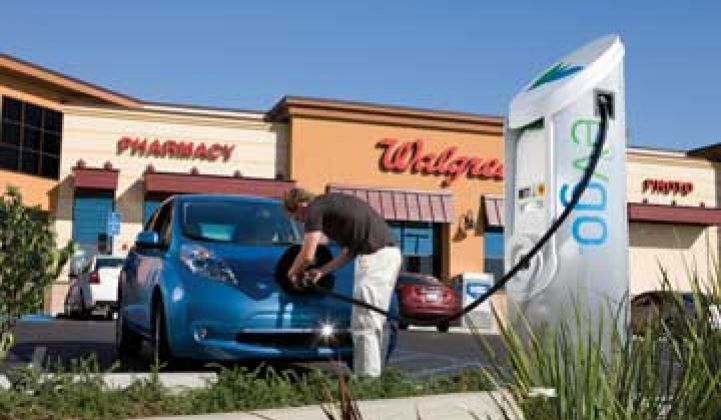It doesn’t matter if range anxiety is real or perceived. If it keeps people from buying electric vehicles, it’s a problem for those who have a stake in the success of this burgeoning driving revolution.
To combat that, NRG Energy opened its first eVgo Freedom Station in Texas on Friday, which has a high-speed DC charger, to inspire range confidence. The privately funded network of high-speed 480-volt DC chargers will include 70 stations in the Dallas/Fort Worth area and another 50 in Houston, with half in place by summertime
The inaugural charger at a Walgreens in Dallas (located at 5201 Belt Line Road, if you want to roll up in your Leaf) can add up to 30 miles of range in as few as 10 minutes, and there’s also a 240-volt Level 2 charger that can add about 25 miles in an hour. Within the two cities, drivers will never be more than five miles from a charger when the network is fully in place.
"Inaugurating the first Freedom Station in the Dallas/Fort Worth Metroplex is a critical first step toward making electric vehicles the smart and convenient choice for Texans who want to reduce their cost of driving while contributing to cleaner air and America's energy independence," David Crane, NRG President and CEO, said in a statement. "We're taking a page from Southwest Airlines when they started out 40 years ago to link the major population centers in Texas. This first station is the start of an ecosystem that will eventually give Texas EV owners the freedom to drive with range confidence throughout the region."
The system of charging stations and network services, which is supported by AeroVironment, General Electric and Siemens, allows people to sign up and pay a flat monthly flee ($49 to $89) for access to charging stations both at home and on the road. The full package, at $89, “is like a buffet,” said Crane. “It includes all the electricity your car can eat.” He was also quick to point out that as gas prices have climbed since the eVgo network was announced five months ago, the price of the plans has stayed the same. “Petroleum doesn’t set the price of electricity at any time,” he said.
Currently, most charging is done at home, where cars sit for long periods of time. And despite the fact that most Americans drive 50 miles or less in a day, the notion of range anxiety is very real -- and, as carmakers noted at a recent conference, it will need to be assuaged through either better education and/or by building charging networks, like this one.
However, the idea of having a charging station at home that you don’t have to pay for upfront -- in addition to ready access to chargers when you're out and about -- sounds very appealing, especially because even the most expensive package is less than the estimated $169 in gas the average American driver pays per month, according to Crane.
In addition to Walgreens, charging stations will also be located at Best Buy, Crescent Real Estate, Gallery Furniture, H-E-B/Central Market, Memorial City Mall, Park 'N Fly, and Spec's Family Partners. NRG is also planning to electrify Interstate 45 between the two metropolitan areas sometime in 2012.
NRG is also looking into other markets, primarily deregulated ones like in the Northeast or California, to expand the charging networks if they prove successful in Texas.



